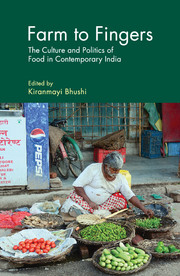Book contents
- Frontmatter
- Dedication
- Contents
- List of Figures and Tables
- Preface
- 1 Introduction
- 2 The Making of ‘Edible Animal Source Foods’ and its Contemporary Reality in Delhi
- 3 Appropriating the Cow: Beef and Identity Politics in Contemporary India
- 4 Eating Akhuni in India
- 5 Health, Standardization and ‘Bengali’ Sweets
- 6 Treating Children, Feeding Junk Food: An Inquiry into a Middle Class Project
- 7 Diaspora Dish: Cooking, Writing, and Creating Identities in Food-blogs
- 8 Measuring Hunger: Debates on an ‘Adequate’ Diet in Colonial North India
- 9 Managing Food: India's Experience with the Public Distribution System
- 10 Food Sovereignty: The Future of Food
- Contributors
- Index
6 - Treating Children, Feeding Junk Food: An Inquiry into a Middle Class Project
Published online by Cambridge University Press: 05 July 2018
- Frontmatter
- Dedication
- Contents
- List of Figures and Tables
- Preface
- 1 Introduction
- 2 The Making of ‘Edible Animal Source Foods’ and its Contemporary Reality in Delhi
- 3 Appropriating the Cow: Beef and Identity Politics in Contemporary India
- 4 Eating Akhuni in India
- 5 Health, Standardization and ‘Bengali’ Sweets
- 6 Treating Children, Feeding Junk Food: An Inquiry into a Middle Class Project
- 7 Diaspora Dish: Cooking, Writing, and Creating Identities in Food-blogs
- 8 Measuring Hunger: Debates on an ‘Adequate’ Diet in Colonial North India
- 9 Managing Food: India's Experience with the Public Distribution System
- 10 Food Sovereignty: The Future of Food
- Contributors
- Index
Summary
The context
Of late, children's consumption of ‘Food High in Fat, Sugar and Salt’ (HFSS), popularly known as ‘junk food’, is making headlines in national dailies. The context is an ongoing, inconclusive debate and contestation on junk food triggered by a public interest litigation. This debate reflects the growing endorsement and public support for discourses on health and nutrition seeking to raise public awareness of the harmful effects for children's health of certain kinds of foods: burgers, pizzas, colas, chips, samosas, fries and chocolates. McDonald's, a multinational restaurant chain retailing processed fast foods, is one of the prime suspects in the proposed list.
Against the backdrop of this debate, I wish to question whether the measures proposed by the key players in this debate will ‘save’ children from the health hazards of junk food? In raising this question, I have in mind an overlooked dimension of the entanglement of children in junk food viz. ‘treating children’, which entails rewarding children for achievements related to scholastic performance by dining out at McDonald's. The fervour with which this is observed, qualifies treating children as ritualistic behaviour associated with eating; it is an evidence of the ‘pervasiveness of ritual behaviour in modern everyday life’ (Rook 1985) in form of consumption.
The popularity of McDonald's as a venue for treating children is intriguing since it runs counter to the concerns voiced in the public debates on junk food. To my mind, it is critical to get into this vexing association between children and junk food. In this paper I will examine this in order to understand the underlying imperative of treating children.
This examination is contextualized within the middle class universe in ‘postliberalization’ India. ‘Liberalization’ marked a decline of the Nehruvian era and ushered in the pro-globalization economic policies that have been followed consistently by the political regimes since the 1990s (Deshpande 2003: 72-3). The archetypes of this era are ‘cosmopolitan consumers’ or the prosperous ‘upper middle class’ who, having trumped the patriotic producer of the Nehruvian era, produce for the global market and bring in foreign exchange.
- Type
- Chapter
- Information
- Farm to FingersThe Culture and Politics of Food in Contemporary India, pp. 128 - 156Publisher: Cambridge University PressPrint publication year: 2017

